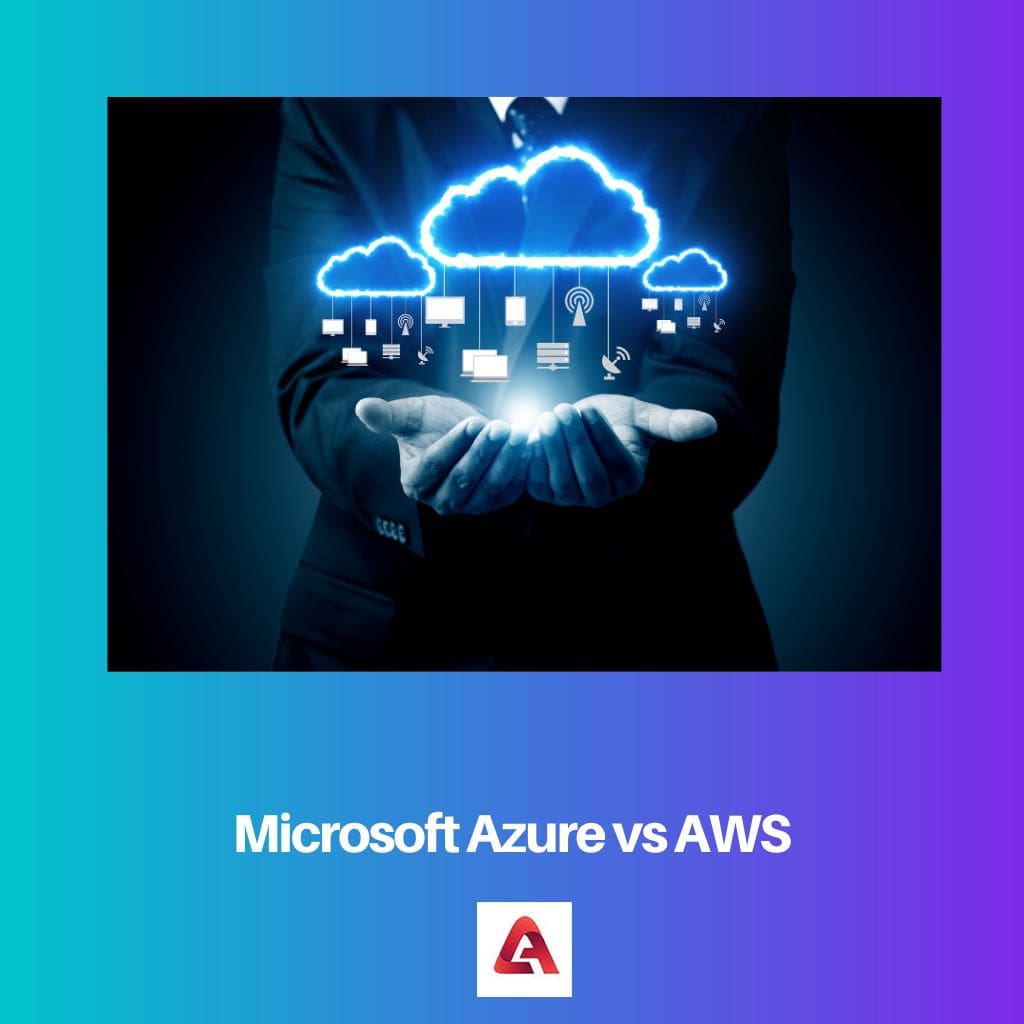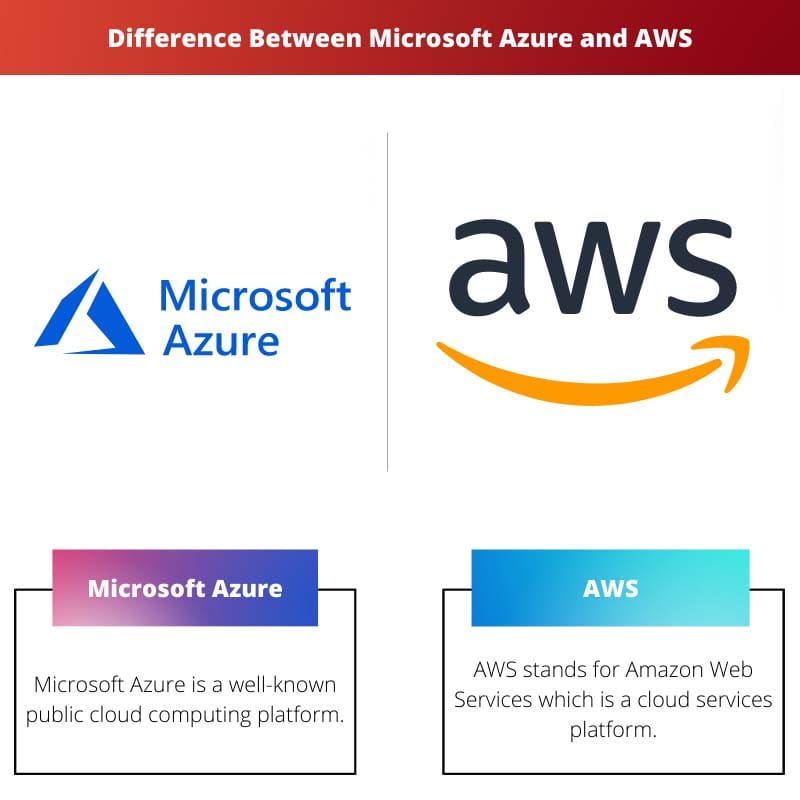Cloud services platforms like Microsoft Azure and Amazon Web Services (AWS) are well-known for offering various tools for business.
Both of these platforms help in providing flexible data storage, high computing power, service management, hosting web applications, etc. that help a business grow.
Key Takeaways
- Microsoft Azure is a cloud computing service provided by Microsoft, while AWS is a cloud computing service provided by Amazon.
- Azure focuses more on integrating Microsoft products and services, while AWS is more platform-agnostic.
- Azure offers more comprehensive security features than AWS.
Microsoft Azure vs AWS
Microsoft Azure is a public cloud computing platform by Microsoft with a user-friendly system that comes at an affordable price point. Amazon Web Services (AWS) offers cloud computing services that are great for big data services. It offers many features and customisations to users.

Microsoft Azure is a start-up-friendly cloud platform as it provides very high performance at a low cost. It is not a good option if one needs to archive data as Microsoft Azure doesn’t provide the data archiving and retrieval option for long-term data.
On the other hand, AWS has a “Pay for EBS Volume” pricing model, which is the best in the market for handling big data.
It has a flexible data storage system in Compute Cloud, which means businesses can expand or constrict their storage as needed.
AWS also provides the long-term data archiving and retrieval feature.
Comparison Table
| Parameters of Comparison | Microsoft Azure | AWS |
|---|---|---|
| Storage facility | Temporary storage is offered through D drive. It has an option of site recovery and for additional archiving purpose has Azure Backup. | Temporary storage allocated at the beginning of an instance and gets destroyed in termination. Glacier provides data archiving services. |
| Computing power | Virtual Hard Disk (VHD) is used and the companies must specify the extent of cores and memory. | There are both pre-configured machine images and the liberty of users to configure and customize their own VMs. |
| Pricing models | Azure charges their customers on a per minute basis and for short term pricing models offers pre-paid or monthly options. | AWS charges on hourly basis and has three options on demand, reserved, and spot. |
| Security | Microsoft Azure grants permission to access a whole account. | AWS security grants permission for defined roles and thus gives access to control particular features. |
| Hybrid cloud ecosystem | Powerful hybrid cloud services with Hybrid SQL server, Azure Stack, etc. | Offers Snowball Edge, a 100TB hard drive that allows a company to transfer data between cloud and data centers. |
| User friendly | Azure is a Windows platform so for a Windows user there is nothing extra to learn. | AWS has a broader ecosystem than Azure and also provides more features and configurations. |
What is Microsoft Azure?
Microsoft Azure is a well-known public cloud computing platform. It uses Virtual Network (VNET), which gives the users freedom to create isolated networks, private IP addresses, and network gateways.
Though Microsoft Azure is one of the best options for small businesses and startups due to its low cost, the storage system for big data is not satisfying and has many bugs. In that case, premium storage is required, which increases the cost.
There is a variety of storage services offered by Microsoft Azure, which includes Page Blobs for block storage, Block Blobs and Files for object storage, Azure Drive, Table Storage, etc.
Azure Table and HDInsight provide support for relational database management systems (RDMS) like NoSQL and Big Data.
The number of options available to a Microsoft Azure user for languages, frameworks, and tools is multiple, which allows a business to choose what’s best for its company and clients.
Microsoft Azure also has several compliance offerings like HIPAA, FIPS, and ITAR and claims that only the screened person can have access to a government-level cloud system.
The disadvantage of using Microsoft Azure is the platform is mostly fit for the Windows environment, and when it comes to open-source, the platform is less flexible.
Moreover, the platform is not ideal for a big data ecosystem and has several glitches.
What is AWS?
AWS stands for Amazon Web Services, which is a cloud services platform currently dominating the global marketplace. With Virtual Private Cloud (VPC) provided by AWS, users can create intracloud isolated networks.
AWS is known for providing the best big data ecosystem among all cloud services platforms. It is also flexible across open-source operating systems and thus provides Linux users with better open-source integrations.
The platform AWS provides a lot of features and customization choices for its users with the help of many third-party integrations.
AWS is not known as the ideal provider of a hybrid cloud ecosystem. But for storage purposes, it offers ample options like S3, Buckets, EBS, CloudFront, AWS Import/Export, etc.
AWS uses the pay-as-you-go model as its pricing model and offers three different choices to the customers. The on-demand model allows users to pay for what is used without any upfront cost.
One can go for the Reserve model to reserve an instance for 1 to 3 years. The last model is Spot, where the customers have to bid for the extra capacity available.

Main Differences Between Microsoft Azure and AWS
- Microsoft Azure provides a better choice for a hybrid cloud ecosystem. On the other hand, AWS is better for big data services.
- Microsoft Azure is user-friendly for the customers who use Windows environments. AWS provides a lot of features and computing power to open-source users as well.
- Microsoft Azure is pocket-friendly for young startups and small businesses. AWS provides three different choices for its pay-as-you-go pricing model.
- Microsoft Azure doesn’t allow long-term data archiving and retrieving. With AWS, data can be archived for a long time.
- Microsoft Azure allows permission to access a whole account or government-level cloud. AWS can provide access to control specific features.

The article presents a clear distinction between Microsoft Azure and AWS, allowing businesses to evaluate which platform aligns with their needs more effectively.
The in-depth comparison table is indeed helpful, but the mention of disadvantages in both platforms is essential to present a balanced view.
This article provides detailed information about Microsoft Azure and AWS, enabling businesses to make informed decisions about which platform to choose.
The article offers valuable insights into the features and differences between Microsoft Azure and AWS, which is beneficial for businesses considering cloud platforms.
The article provides a comprehensive comparison between Microsoft Azure and AWS, making it easier for businesses to choose the suitable cloud platform.
The comparison between Microsoft Azure and AWS is well-presented, but the reader should also be informed about the potential challenges associated with these platforms.
The detailed features and pricing model comparison makes it clear for new businesses. However, the disadvantages of both platforms need to be explained more.
The article’s detailed comparison table makes it easier for businesses to understand the specific features and benefits of Microsoft Azure and AWS, aiding in decision-making.